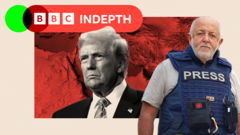Trump's approach to the Israeli-Palestinian conflict faces new challenges and changing dynamics, with pressures from both internal Israeli politics and external Arab expectations shaping his potential policies.
The Shifting Dynamics in U.S.-Israel Relations: Is Trump Still the Disruptor?

The Shifting Dynamics in U.S.-Israel Relations: Is Trump Still the Disruptor?
As Donald Trump prepares for a second term, the landscape of Israeli politics and the broader Middle East has transformed significantly.
In the wake of Donald Trump's anticipated return to the Oval Office, the intricate dynamics of U.S.-Israel relations are set to shift markedly compared to his previous term. Trump's decisive intervention last May facilitated a ceasefire deal in Gaza that Prime Minister Benjamin Netanyahu had resisted under Joe Biden’s leadership. This move indicated Trump’s willingness to prioritize his own political agenda over the desires of Israel's leadership.
Currently, Netanyahu is grappling with a coalition crisis fueled by his ultranationalist allies who are staunchly opposed to negotiations with Hamas, with figures like Itamar Ben-Gvir demanding military escalation against Gaza. This internal strife is unlikely to concern Trump, who has already shown a tendency to prioritize his presidency over Netanyahu’s political needs.
Under Biden, the U.S. position involved exerting pressure on Israel regarding humanitarian concerns in Gaza, a stance that garnered criticism in both American and Israeli circles. Following Trump's sweep in the November elections, many in Israel's far-right anticipated another period of unyielding support from the U.S. However, the landscape has changed since Trump's departure from office in January 2021.
A pivotal moment during Trump’s initial term, the relocation of the U.S. embassy to Jerusalem on May 14, 2018, starkly illustrated this duality. While Ivanka Trump and Jared Kushner celebrated this act, Israeli forces conducted a violent crackdown in Gaza, resulting in significant Palestinian casualties during protests. This marked the beginning of the tumultuous phases culminating in the recent crisis initiated by Hamas' surprise attack on October 7, 2023.
Now, with the conflict intensifying, Israel has conducted extensive retaliatory strikes on Gaza, leading to widespread devastation and humanitarian crises. As both domestic and international scrutiny mounts, Trump's stance on the establishment of a Palestinian state may clash with his historical support from Israel's nationalist factions, considering that Netanyahu remains unwilling to offer Palestinians an independent entity.
Echoing similar sentiments, the newly proposed normalization deal between Israel and Saudi Arabia has rekindled calls for Palestinian rights. Crown Prince Mohammed bin Salman has indicated that without tangible progress for the Palestinians, any cooperative efforts would stall.
Trump’s forthcoming administration, led by national security advisor Mike Waltz, is poised to prioritize an agreement with Saudi Arabia but will have to navigate the demands linked to Palestinian sovereignty—something that may challenge the longstanding Israeli narrative of dominance.
The path forward may lead to a confrontation of interests as Trump seeks an elusive peace deal in the Middle East while managing Netanyahu’s expectations and the pressing demands from Arab nations seeking to align with the U.S. In this complex political landscape, the question remains: will Trump be the same disruptor as before, or will he adapt to the evolving realities of the Middle East?























